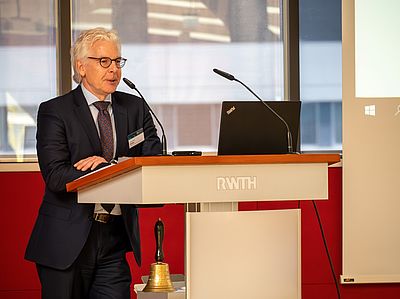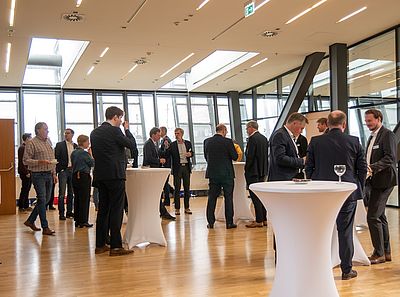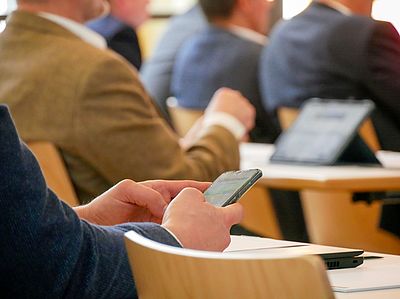"Shaping the future of rubber research" – that was the motto chosen by the Deutsche Kautschuk Gesellschaft e.V. (DKG) and the IKV for the jointly organised event "DKG West meets Science". On 26 and 27 April 2023, the Super C in Aachen provided the stage for stimulating talks and exciting discussions among the 40 or so participants.
Dr Harald Keuter, Chairman of the DKG Regional Group West, identified the megatrends presenting a major challenges to the rubber industry in his welcoming address: the explosion in costs for energy, raw materials and materials, the close link with the economic situation in the automotive industry and the change that e-mobility is bringing about for the rubber industry. The shortage of skilled workers and young talent have long since ceased to affect only industry, but are increasingly affecting research institutions, which are also having to struggle more and more for funding, as the proportion of approved funding applications, especially for basic research, has been declining for years. In addition to sustainability issues, new regulations, REACH and especially the looming PFAS restrictions are driving the industry. "Rubber is essential in most areas of life, but it is not sexy", he concluded somewhat provocatively. A statement that the speakers enthusiastically refuted with their commitment to the diversity of the material, current research, new developments and the resulting technical possibilities.
Solidarity and cooperation in the industry are required in order to meet the current challenges. Strengthening both was the aim of "DKG West meets Science". Speakers and participants came from all areas of the rubber industry: raw material producers and machine manufacturers as well as processors and representatives of the customer industries and research institutions.
The focus of the 14 presentations included sustainability and resource efficiency, optimised product and process design, new material trends and possibilities for lightweight construction. Between the individual presentations, the participants were able to give their assessment of the situation in the rubber industry in Mentimeter polls. The results of the Mentimeter polls were taken up in moderated discussion rounds at the end of each day. On day 1, the focus was on the market's expectations of the research, on day 2 on the framework conditions for the planned research.
According to the polls, industry does perceive research as being practice-oriented. Graduates are generally well qualified, but communication between industry and research could be improved. The preferred form of cooperation for industry seems to be the promotion of Bachelor's and Master's theses in their own companies, followed by partnerships in joint research projects. Visits to research institutions, participation in project monitoring committees and co-financing of joint industrial research are also important for companies.
The stimulating conversations continued during the tour of the new injection moulding hall and the rubber laboratory, followed by dinner in the new rooms of the IKV at the end of the first day. No wonder that the majority of the participants - this was also the result of a Mentimeter poll - rated the workshop as productive and would recommend it to others. However, communication and notification in the run-up could be improved.
Contact for questions
Fabian Fey, M.Sc.
+49 241 80-28355
fabian.fey@ikv.rwth-aachen.de



